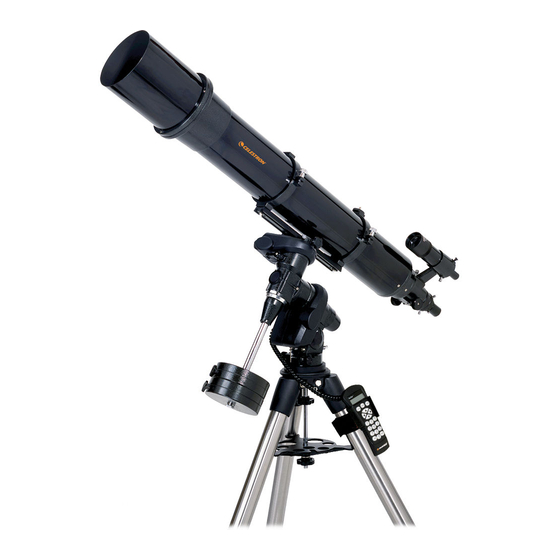Celestron CGE1100 Aanvullende handleiding - Pagina 7
Blader online of download pdf Aanvullende handleiding voor {categorie_naam} Celestron CGE1100. Celestron CGE1100 17 pagina's. Cge series telescopes
Ook voor Celestron CGE1100: Handleiding communicatieprotocol (8 pagina's)

6. Carefully center the object in the center of the eyepiece and press ALIGN.
7. Use the Up/Down arrow keys to assign a number for the star and press ENTER.
To add additional calibration stars
Tips for
adding calibration stars:
•
Make sure that the calibration stars that you choose are on the other side of the meridian from the
alignment stars that you used to align the telescope.
Sync:
The Sync feature can be used to improve pointing accuracy in a specifi
u
seful feature especially when used in conjunction with the Constellation tour and Identify feature in which
you will
be exploring smaller areas of the sky. To Sync on an object:
1. Select the desired star (or object) from the database and slew to it.
2. Once centered, press the UNDO button until you are at the main menu.
3. With CGE Ready displayed, press the ALIGN key on the hand control.
4. Use the Up/Down buttons and select the Sync option and press ENTER.
5. Align the Sync object in the center of the finderscope and press ENTER.
6. Carefully center the object in the center of the eyepiece and press AL
Your telescope's pointing accuracy will now be improved in that area of the sky.
NOTE: Sync
can improve your telescope's pointing accuracy over a wide area or over smaller areas of the sky
d
epending on the quality of the initial alignment, as well as where the telescope was pointing when the Sync
w
as done.
Undo Sync:
Since doing a Sync can affect your pointing accuracy in other parts of the sky, it may be necessary to 'Un-
Sync" your telescope when exploring other parts of the sky. Doing an Un
y
our telescope to its original alignment. Additionally, if you wish to add calibration stars or re-alignment stars
y
ou will be asked to do an Undo Sync before you will be able to proceed
O
b
j
e
c
t
C
O
b
j
e
c
t
C
Selecting an Object
Now that the telescope is properly aligned, you can choose an object from any of the catalogs in the telescope'
extensive d
atabase. The hand control has a key (4) designated for each of the catalogs in its database. There are
tw
o ways to select objects from the database: scrolling through the named object lists and entering object
numbers.
Pressing the LIST key on the hand control will access all objects in the database that have common name
types. Each list is broken down into the following categories: Named Stars, Named Object, Double Stars,
Variable Stars, Asterisms and CCD Objec
Helpful
alphabetical listing of the objects under that list. Pressing the Up and Down keys (10) allows you to scroll
Hint
through the catalog to the desired object.
W
hen scrolling through a long list of objects, holding down either the Up or Down key will allow you to scroll
through the catalog more rapidly by only displaying every fifth catalog object.
Pressing any of the other catalog keys (M, CALD, NGC, or STAR) will display a blinking cursor be
n
ame of the catalog chosen. Use the numeric key pad to enter the number of any object within these
st
andardized catalogs. For example, to find the Orion Nebula, press the "M" key and enter "042".
, repeat steps 1-6 again.
a
t
a
l
o
g
a
t
a
l
o
g
ts. Selecting any one of these catalogs will display a numeric-
c region of the sky. Sync is a very
IGN.
do Sync will restore the pointing of
s
s or
low the
